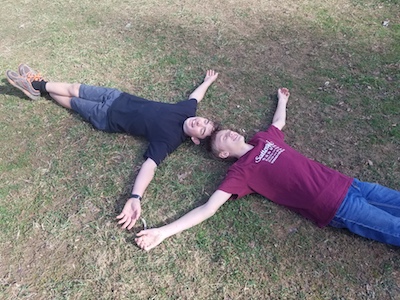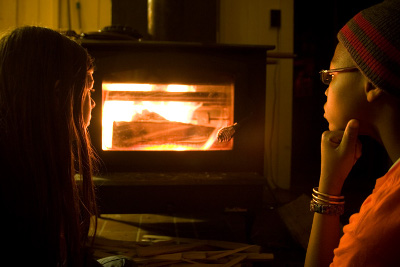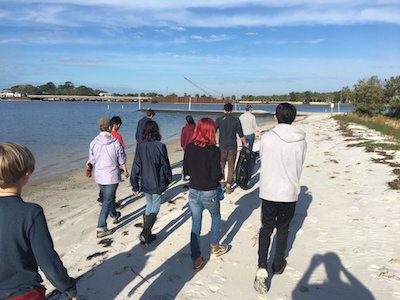Addressing Climate Change Through Education

Two years ago while on an 18 days field trip to Florida, a group of our students visited a city council meeting . On the agenda was addressing the disappearing coastline. To some, a city council meeting might seem boring, but our students were fascinated. They watched the adults in the room talk about how the shoreline was continuously shrinking, but no one actually acknowledged the reason. “They refused to say climate change. It was ridiculous,” said Rey, an AMS alum who participated in that trip.
Today, in the middle of a heat wave in January, the idea that climate change is an debatable theory seems increasingly absurd. While Arthur Morgan School has always had its share of middle school boys that spend all winter in shorts, it is very rare for students to be sunbathing on the slab at this time of year. Usually, students are darting from one heated classroom to the next, maybe stopping for an impromptu snowball fight on the way. Instead they are lounging on the grass and soaking up the sun as if it were the last week of school. This makes it the perfect time to talk about climate change and the effect it will have on their future.
Climate Change is Not Just an Academic Topic
 Concern about humans’ effect on the planet has always been a part of AMS’s mission. In classes and conversations, we encourage our students to be act responsibly and think about their impact. Our wood stoves ensure that we are using renewable resources for heat. Growing our own food means lowering our reliance on big agriculture. Signs in bathroom stalls remind us to not let faucets run and turn off lights. Challenges like using no electricity for a full 24 hours demonstrate just how much we use in a day and help student reflect on whether it’s necessary.
Concern about humans’ effect on the planet has always been a part of AMS’s mission. In classes and conversations, we encourage our students to be act responsibly and think about their impact. Our wood stoves ensure that we are using renewable resources for heat. Growing our own food means lowering our reliance on big agriculture. Signs in bathroom stalls remind us to not let faucets run and turn off lights. Challenges like using no electricity for a full 24 hours demonstrate just how much we use in a day and help student reflect on whether it’s necessary.
In 2011, the school introduced its Green Initiative Fund. Through donations, we were able to replace many of the school’s appliances with energy efficient ones. We installed thermal panels on Elizabeth’s Hall in 2013. In 2015, we transformed part of our cow pasture to a solar panel array. All of these efforts made a dramatic change in AMS’s carbon footprint. However, they were also not enough to make a real difference.
Making Eco-Friendly Choices is Not Enough
Climate change is not going to be stopped by changing the school’s consumer habits. The idea that buying LED lightbulbs is fighting climate change is a lie created by corporations and politicians. It helps people feel like they are doing something positive while allowing corporations to continue their own destructive practices and driving a market for “eco-friendly” goods. Alden Wicker, a known sustainable lifestyle blogger, writes about how “conscious consumerism is a lie” in his Quartz article from 2017. In it, he references a 2012 study that shows no meaningful difference in the carbon footprints left by consumers with eco-friendly habits and regular ones.
Just like our students in the city council meeting began to understand two years ago, climate change isn’t going to be fixed by purchasing choices. It needs to first be addressed politically. If politicians aren’t willing to acknowledge climate change–or even publicly say the phrase–then actions like buying all your clothes second hand will have very little effect.
Climate Change is Everywhere
 Our students are learning that if they want change to occur, they need to use their voice and get involved to make that change happen. This year we don’t have a field trip that is specifically studying climate change. However all three trips will still reflect on the politics of climate change. The Forced Migrations trip will look at how climate policies in our country affect people around the world and our refusal to provide aid to those we put in harm’s way. Birth, Life and Death will examine the political structures that promote a highly consumeristic birth system and make opting for green burials extremely challenging. The Philosophy trip is returning to Florida and will visit communities affected by climate change while discussing the moral implications that go with our current culture’s harmful practices.
Our students are learning that if they want change to occur, they need to use their voice and get involved to make that change happen. This year we don’t have a field trip that is specifically studying climate change. However all three trips will still reflect on the politics of climate change. The Forced Migrations trip will look at how climate policies in our country affect people around the world and our refusal to provide aid to those we put in harm’s way. Birth, Life and Death will examine the political structures that promote a highly consumeristic birth system and make opting for green burials extremely challenging. The Philosophy trip is returning to Florida and will visit communities affected by climate change while discussing the moral implications that go with our current culture’s harmful practices.
Our students are learning about these topics right now while they run around in shorts and t-shirts. They are thinking about what it means that it is 65 degrees in January and what they can do that might actually change the path our world is headed down. While we don’t want them to feel guilty about enjoying getting to lie in the sun between classes, it is important for them to know how to navigate a future that is rapidly changing.
-Nicholas Maldonado
